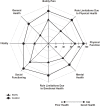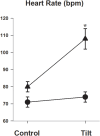Cognitive function, health-related quality of life, and symptoms of depression and anxiety sensitivity are impaired in patients with the postural orthostatic tachycardia syndrome (POTS)
- PMID: 25009504
- PMCID: PMC4070177
- DOI: 10.3389/fphys.2014.00230
Cognitive function, health-related quality of life, and symptoms of depression and anxiety sensitivity are impaired in patients with the postural orthostatic tachycardia syndrome (POTS)
Abstract
The Postural Orthostatic Tachycardia Syndrome (POTS) is a condition in which heart rate increases abnormally when the individual assumes an upright position. In addition to the marked tachycardia, presyncope, and syncope, patients with POTS often complain of light-headedness, fatigue, and difficulty in concentrating. The present study assessed individuals with POTS for psychiatric comorbidity, anxiety sensitivity and health related quality of life and examined general cognitive ability. Data was obtained from patients with POTS (n = 15, 12 female, aged 30 ± 3 years) and age matched healthy subjects (n = 30, 21 female, aged 32 ± 2 years). Patients with POTS commonly presented with symptoms of depression, elevated anxiety and increased anxiety sensitivity, particularly with regards to cardiac symptoms, and had a poorer health related quality of life in both the physical and mental health domains. While patients with POTS performed worse in tests of current intellectual functioning (verbal and non-verbal IQ) and in measures of focused attention (digits forward) and short term memory (digits back), test results were influenced largely by years of education and the underlying level of depression and anxiety. Acute changes in cognitive performance in response to head up tilt were evident in the POTS patients. From results obtained, it was concluded that participants with POTS have an increased prevalence of depression and higher levels of anxiety. These underlying symptoms impact on cognition in patients with POTS, particularly in the cognitive domains of attention and short-term memory. Our results indicate that psychological interventions may aid in recovery and facilitate uptake and adherence of other treatment modalities in patients with POTS.
Keywords: noradrenaline transporter; orthostatic intolerance; psychiatric comorbidity; sympathetic nervous system; tachycardia.
Figures



Similar articles
-
Autonomic nervous system dysfunction in adolescents with postural orthostatic tachycardia syndrome and chronic fatigue syndrome is characterized by attenuated vagal baroreflex and potentiated sympathetic vasomotion.Pediatr Res. 2000 Aug;48(2):218-26. doi: 10.1203/00006450-200008000-00016. Pediatr Res. 2000. PMID: 10926298
-
Autonomic dysfunction presenting as postural orthostatic tachycardia syndrome in patients with multiple sclerosis.Int J Med Sci. 2010 Mar 11;7(2):62-7. doi: 10.7150/ijms.7.62. Int J Med Sci. 2010. PMID: 20309394 Free PMC article.
-
Postural orthostatic tachycardia syndrome in patients of orthostatic intolerance symptoms: an ambispective study.AIMS Neurosci. 2020 Dec 8;8(1):74-85. doi: 10.3934/Neuroscience.2021004. eCollection 2021. AIMS Neurosci. 2020. PMID: 33490373 Free PMC article.
-
Postural tachycardia syndrome: a heterogeneous and multifactorial disorder.Mayo Clin Proc. 2012 Dec;87(12):1214-25. doi: 10.1016/j.mayocp.2012.08.013. Epub 2012 Nov 1. Mayo Clin Proc. 2012. PMID: 23122672 Free PMC article. Review.
-
Sympathetic dysfunction in vasovagal syncope and the postural orthostatic tachycardia syndrome.Front Physiol. 2014 Jul 28;5:280. doi: 10.3389/fphys.2014.00280. eCollection 2014. Front Physiol. 2014. PMID: 25120493 Free PMC article. Review.
Cited by
-
Autonomic dysregulation, cognition and fatigue in people with depression and in active and healthy controls: observational cohort study.BJPsych Open. 2023 Jun 14;9(4):e106. doi: 10.1192/bjo.2023.68. BJPsych Open. 2023. PMID: 37313995 Free PMC article.
-
Cognitive functioning in postural orthostatic tachycardia syndrome among different body positions: a prospective pilot study (POTSKog study).Clin Auton Res. 2023 Aug;33(4):459-468. doi: 10.1007/s10286-023-00950-0. Epub 2023 Jun 1. Clin Auton Res. 2023. PMID: 37261636 Free PMC article.
-
Considerations in Children and Adolescents Related to Coronavirus Disease 2019 (COVID-19).Phys Med Rehabil Clin N Am. 2023 Aug;34(3):643-655. doi: 10.1016/j.pmr.2023.03.004. Epub 2023 Mar 31. Phys Med Rehabil Clin N Am. 2023. PMID: 37419537 Free PMC article. Review.
-
Quality of life and physical/psychosocial factors in children and adolescents with orthostatic intolerance.Biopsychosoc Med. 2023 Jun 12;17(1):23. doi: 10.1186/s13030-023-00278-1. Biopsychosoc Med. 2023. PMID: 37308984 Free PMC article.
-
Brain fog in neuropathic postural tachycardia syndrome may be associated with autonomic hyperarousal and improves after water drinking.Front Neurosci. 2022 Aug 5;16:968725. doi: 10.3389/fnins.2022.968725. eCollection 2022. Front Neurosci. 2022. PMID: 35992935 Free PMC article.
References
LinkOut - more resources
Full Text Sources
Other Literature Sources
Medical

